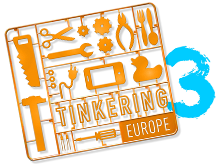RESOURCES & EVENTS
The project will develop workshops and resources for adults that support them in their self-confidence, stimulate lifelong learning, contribute to development of 21st Century skills, and encourage exchange of expertise and practice across the community development and informal learning sectors.
The following recourses will be produced and be available on this page as the project progresses:
Theoretical Framework of adult participation
This document will set out the current landscape of adult participation in STEM in Europe in relation to underserved and disadvantaged adults, and will outline the theoretical rationale for understanding the relationship between:
- Tinkering as a pedagogical approach
- Equity and inclusion in STEM
- Creating more inclusive STEM adult education and learning opportunities for underserved adult audiences
By exploring the relationship between these three areas, this document outlines the potential of Tinkering for supporting more equitable lifelong learning in STEM.
Current understanding of adult participation in the various countries is the first intellectual output and a foundation of the project.
Tinkering Activities for Adults
Tinkering resources that can be used by community development and informal learning practitioners working with adult groups. Some of the activities are newly developed while others are adjusted from already existing and tested activities. Special focus will be given to activities suitable for adults from different backgrounds, taking into account different needs, interests and motivations.
Guidelines for Focus Groups
This document is aimed primarily at Informal Learning (IFL) educators working with adult learners from disadvantaged and underserved communities, who wish to:
- Exploit the inclusive nature of Tinkering to create engaging and relevant STEM learning experiences for adult learners and their families
- Better understand how and why collaboration and co-design with community organisations can help develop more inclusive programming in STEM learning for adults.
It can also serve as a useful reference for community leaders and adult educators wishing to collaborate with the IFL sector to explore the use of Tinkering with the adult groups that they serve.
GUIDE FOR MUSEUMS AND OTHER INFORMAL LEARNING AND SCIENCE ENGAGEMENT ORGANIZATIONS
This document gathers the ultimate reflections from the project partners, for science centres, museums and other places of science education interested in exploring the potential of Tinkering for inclusive learning and engagement. It presents lessons learned about:
- The co-design and the development of the activities.
- Relevant elements to consider to build meaningful relationship with the local communities.
- The contribution the Project has given to each partner’s institutional change at a wider level.
The interactive version of the tool is available here:
An offline readable version of the resource is also available here:
